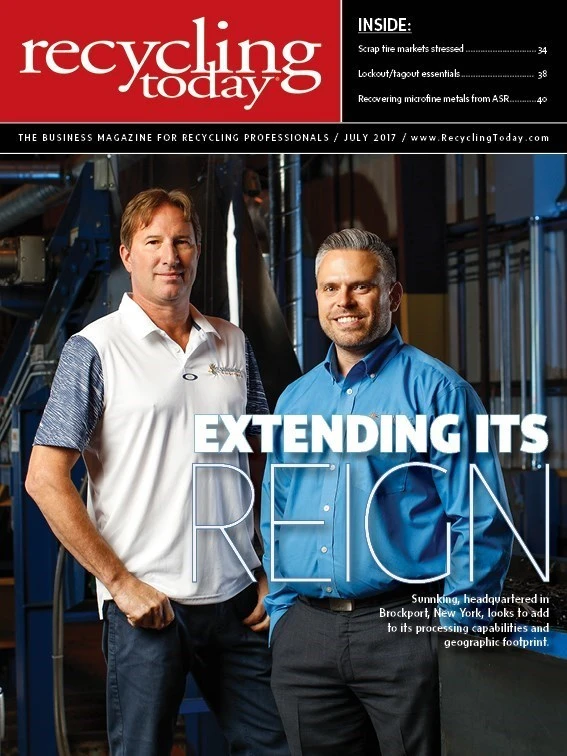Demand and pricing for brown grades jumped considerably in the June buying period from the month prior, most notably on the West Coast, thanks in part to the seasonal slowdown in
Old corrugated containers (OCC) pricing climbed by $25 per ton on the West Coast and by $10 and $5 per ton across the rest of the U.S., according to the June 5 PPW Yellow Sheet from Boston-based research firm RISI. Domestic mills paid 71 percent more for OCC at the start of the week of June 5, 2017, compared with the same time in 2016, RISI reports. The bulk grade’s price was up 66 percent for exports to China.
Export prices to China increased by $19 to $37 per ton FAS (free alongside ship, meaning the seller must deliver goods to a named port alongside a vessel the buyer designates) for the major secondary fiber grades (with the exception of sorted office paper [SOP], which dropped by $5 per ton out of Los Angeles and San Francisco/Oakland and by $10 per ton out of New York).
OCC prices to China saw a hike of $37 per ton FAS out of the Los Angeles and the San Francisco/Oakland ports, $35 per ton from New York and $19 per ton from Chicago.
A Midwest-based recycler says his company has had “good movement for all of our grades.” He says of paper stock dealers located on the coasts: “If you’re by the water, happy days are here again.”
However, the recycler adds, “As China fills back up, you’re going to see the exports come back to reality.”
“[Domestic mills] are fighting for every ton because they want to make sure they have enough inventory to carry through the Fourth of July weekend.” – a broker based on the East Coast
Beginning in November 2016 until the first week of March 2017, China was “aggressively” buying U.S. secondary paper when “they just stopped,” says a broker based on the East Coast. By the end of April, China was back again, pushing prices up in the U.S. market.
“The Chinese seem to be wanting to slow down this craziness of $10 increases a week. They’re trying to slow it back a little bit, but we’re really at the same level now [as] when we peaked in March,” the broker says.

That country’s National Sword campaign to crack down on contaminants in incoming loads of recyclables has “certainly gotten the attention of the recycling community,” he says. For the first time, one of his customers—“a huge recycling company”—had a rejection on a load shipped from the East Coast as a result of this campaign.
The Midwest-based recycler says that because of National Sword, “I heard China is going to stop buying mixed paper in June.”
He adds, “I’m a little concerned
The recycler shares that in his company’s most recent audit of inbound material from a residential metropolitan area that it serves, mixed paper made up more of the total tonnage: In 2012, 49.9 percent of the metro area’s volume was old newspapers (ONP). In its most recent audit, ONP comprised 11.3 percent.
“If you’re by the water, happy days are here again.” – a Midwest-based recycler
“We were shocked at how low newsprint was,” he says. “It’s more mixed than anything else because we don’t have any news left in our inbound.”
At an average U.S. price of $96.11 per ton in March 2017, mixed paper reached its highest pricing point ever, more than double the March 2016 price of $46.39 per ton. In June 2017, the grade sold at the same U.S. average price it was going for exactly one year ago: $63.61 per ton.
With a strong domestic market, sources say U.S. mills are ensuring they are prepared for the Fourth of July, which falls on a Tuesday. They point to delivery delays as drivers take time off for the extended weekend.
“There’s no domestic mill giving up anything to export if they can help it,” the East Coast-based trader says. “They are fighting for every ton because they want to make sure they have enough inventory to carry through the Fourth of July weekend.”



Explore the July 2017 Issue
Check out more from this issue and find your next story to read.
Latest from Recycling Today
- Green Cubes unveils forklift battery line
- Rebar association points to trade turmoil
- LumiCup offers single-use plastic alternative
- European project yields recycled-content ABS
- ICM to host colocated events in Shanghai
- Astera runs into NIMBY concerns in Colorado
- ReMA opposes European efforts seeking export restrictions for recyclables
- Fresh Perspective: Raj Bagaria





